Deck 13: Project Evaluation and Control
Question
Question
Question
Question
Question
Question
Question
Question
Question
Question
Question
Question
Question
Question
Question
Question
Question
Question
Question
Question
Question
Question
Question
Question
Question
Question
Question
Question
Question
Question
Question
Question
Question
Question
Question
Question
Question
Question
Question
Question
Question
Question
Question
Question
Question
Question
Question
Question
Question
Question
Question
Question
Question
Question
Question
Question
Question
Question
Question
Question
Question
Question
Question
Question
Question
Question
Question
Question
Question
Question
Question
Question
Question
Question
Question
Question
Question
Question
Question
Question

Unlock Deck
Sign up to unlock the cards in this deck!
Unlock Deck
Unlock Deck
1/104
Play
Full screen (f)
Deck 13: Project Evaluation and Control
1
An excellent way to coordinate schedules with vendors and suppliers is through the use of:
A) Milestones.
B) S-curves that plot expenditures against time.
C) S-curves that plot planned expenditures against time.
D) A tracking Gantt chart.
A) Milestones.
B) S-curves that plot expenditures against time.
C) S-curves that plot planned expenditures against time.
D) A tracking Gantt chart.
A
2
The project control cycle is continuous.
True
3
A tracking Gantt chart:
A) Monitors costs and budget expenditures.
B) Identifies key points in the project's progress.
C) Identifies the stage of completion for each task.
D) Identifies the performance to budget for the overall project by a certain date.
A) Monitors costs and budget expenditures.
B) Identifies key points in the project's progress.
C) Identifies the stage of completion for each task.
D) Identifies the performance to budget for the overall project by a certain date.
C
4
The first step in the control cycle is:
A) Setting a goal.
B) Measuring progress.
C) Comparing actual with planned performance.
D) Taking action.
A) Setting a goal.
B) Measuring progress.
C) Comparing actual with planned performance.
D) Taking action.

Unlock Deck
Unlock for access to all 104 flashcards in this deck.
Unlock Deck
k this deck
5
Gap analysis refers to any measurement process that first determines the goals and then the degree to which the actual performance lives up to those goals.

Unlock Deck
Unlock for access to all 104 flashcards in this deck.
Unlock Deck
k this deck
6
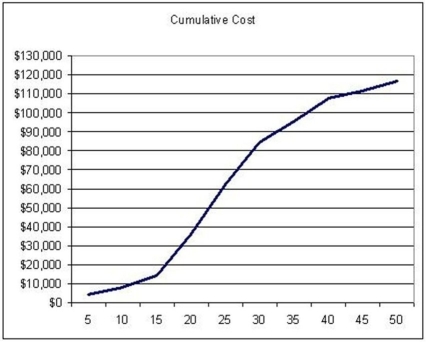
Use the S-curve to choose the BEST statement about the project it describes. The horizontal axis is in weeks.
A) More time passes from weeks 5 to 10 than from weeks 20 to 25.
B) More time passes from $50,000 to $60,000 than from $5,000 to $10,000.
C) More money is spent from weeks 0 to 10 than from weeks 30 to 40.
D) The total amount spent on the project at the end of the 40th week is approximately $110,000.

Unlock Deck
Unlock for access to all 104 flashcards in this deck.
Unlock Deck
k this deck
7
Use the S-curve where the solid line is actual cost and the dashed line is budgeted cost to choose the BEST statement. 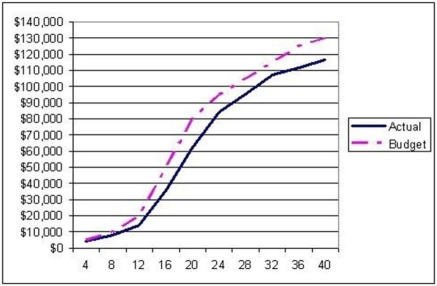
A) The project is further ahead of budget from weeks 36 through 40 than from weeks 8 through 12.
B) The project never experiences negative variance.
C) The project is further behind budget from weeks 0 through 16 than from 24 through 40.
D) The project is in a constant state of positive variance.

A) The project is further ahead of budget from weeks 36 through 40 than from weeks 8 through 12.
B) The project never experiences negative variance.
C) The project is further behind budget from weeks 0 through 16 than from 24 through 40.
D) The project is in a constant state of positive variance.

Unlock Deck
Unlock for access to all 104 flashcards in this deck.
Unlock Deck
k this deck
8
Milestones are generally considered to be:
A) Demotivators for the project team.
B) Key project review gates.
C) The end of the project for all team members except the project manager.
D) Points where two or more activities merge.
A) Demotivators for the project team.
B) Key project review gates.
C) The end of the project for all team members except the project manager.
D) Points where two or more activities merge.

Unlock Deck
Unlock for access to all 104 flashcards in this deck.
Unlock Deck
k this deck
9
A measurement process that determines the project goals and then the degree to which the actual performance lives up to these goals is:
A) A metric system.
B) Goal-performance linkage.
C) Five degrees of separation.
D) Gap analysis.
A) A metric system.
B) Goal-performance linkage.
C) Five degrees of separation.
D) Gap analysis.

Unlock Deck
Unlock for access to all 104 flashcards in this deck.
Unlock Deck
k this deck
10
The classic project S-curve is a plot of:
A) Labor hours versus money expended.
B) Money expended versus elapsed time.
C) Elapsed time versus labor hours.
D) Number of personnel versus days behind schedule.
A) Labor hours versus money expended.
B) Money expended versus elapsed time.
C) Elapsed time versus labor hours.
D) Number of personnel versus days behind schedule.

Unlock Deck
Unlock for access to all 104 flashcards in this deck.
Unlock Deck
k this deck
11
A project manager that uses milestones as a project control device is using a:
A) Proactive control system.
B) Predictive control system.
C) Feedback control system.
D) Reactive control system.
A) Proactive control system.
B) Predictive control system.
C) Feedback control system.
D) Reactive control system.

Unlock Deck
Unlock for access to all 104 flashcards in this deck.
Unlock Deck
k this deck
12
Sketch the project control cycle and discuss the activities that take place in each step.

Unlock Deck
Unlock for access to all 104 flashcards in this deck.
Unlock Deck
k this deck
13
Identify a different key success driver and inhibitor for the project stages of formation, build-up, main phase, and close-out.

Unlock Deck
Unlock for access to all 104 flashcards in this deck.
Unlock Deck
k this deck
14
Measurement mechanisms should include a clear definition of:
A) The project baseline.
B) The reporting relationships among members of the project team.
C) What to measure.
D) Trigger points.
A) The project baseline.
B) The reporting relationships among members of the project team.
C) What to measure.
D) Trigger points.

Unlock Deck
Unlock for access to all 104 flashcards in this deck.
Unlock Deck
k this deck
15
Project goal setting includes setting a baseline plan, which is predicated on:
A) The progress measurement.
B) An accurate work breakdown structure.
C) The type of gap analysis the project team plans to use.
D) The budget and schedule limitations.
A) The progress measurement.
B) An accurate work breakdown structure.
C) The type of gap analysis the project team plans to use.
D) The budget and schedule limitations.

Unlock Deck
Unlock for access to all 104 flashcards in this deck.
Unlock Deck
k this deck
16

Use the S-curve to choose the BEST statement about the project it describes. The horizontal axis is in weeks.
A) The total project costs in week 10 are less than budgeted.
B) The total project costs in week 10 exceed the budgeted cost.
C) The project cost more from weeks 25 through 30 than it did in weeks 10 through 15.
D) The total amount spent on the project at the end of the 20th week is approximately $30,000.

Unlock Deck
Unlock for access to all 104 flashcards in this deck.
Unlock Deck
k this deck
17
Use the S-curve where the solid line is actual cost and the dashed line is budgeted cost to choose the BEST statement. 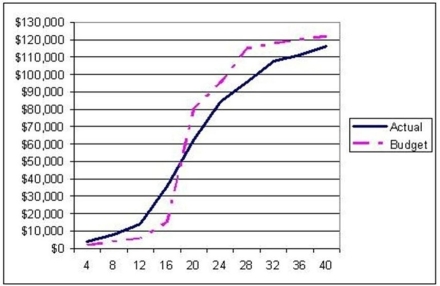
A) The project never experiences negative variance.
B) With regards to budget, the project starts badly but finishes well
C) With regards to budget, the project starts well but finishes badly.
D) The project is in a constant state of positive variance.

A) The project never experiences negative variance.
B) With regards to budget, the project starts badly but finishes well
C) With regards to budget, the project starts well but finishes badly.
D) The project is in a constant state of positive variance.

Unlock Deck
Unlock for access to all 104 flashcards in this deck.
Unlock Deck
k this deck
18
If significant deviations from the project plan are detected, corrective action is taken and then:
A) The monitoring and control cycle begins anew.
B) Project goals are adjusted to reflect current reality.
C) The project stakeholders are informed of the budget or time difficulties.
D) The critical chain is reviewed for task dependency.
A) The monitoring and control cycle begins anew.
B) Project goals are adjusted to reflect current reality.
C) The project stakeholders are informed of the budget or time difficulties.
D) The critical chain is reviewed for task dependency.

Unlock Deck
Unlock for access to all 104 flashcards in this deck.
Unlock Deck
k this deck
19
Define human factors and discuss their impact on project success?

Unlock Deck
Unlock for access to all 104 flashcards in this deck.
Unlock Deck
k this deck
20
What is a tracking Gantt chart and what are the benefits and drawbacks of its use?

Unlock Deck
Unlock for access to all 104 flashcards in this deck.
Unlock Deck
k this deck
21
Earned value management is also known as:
A) The golden triangle method (GTM).
B) The achieved value method (AVM).
C) The program evaluation and review method (PERM).
D) Earned value analysis (EVA).
A) The golden triangle method (GTM).
B) The achieved value method (AVM).
C) The program evaluation and review method (PERM).
D) Earned value analysis (EVA).

Unlock Deck
Unlock for access to all 104 flashcards in this deck.
Unlock Deck
k this deck
22
Since a project may get ahead of or fall behind schedule, a calendar date cannot be a milestone.

Unlock Deck
Unlock for access to all 104 flashcards in this deck.
Unlock Deck
k this deck
23
Which of these tools allows a project team to make future projections of project status based on its current state?
A) Tracking Gantt chart
B) Milestone chart
C) S-curve
D) Earned value management
A) Tracking Gantt chart
B) Milestone chart
C) S-curve
D) Earned value management

Unlock Deck
Unlock for access to all 104 flashcards in this deck.
Unlock Deck
k this deck
24
One strength of S-curve analysis is that it provides real-time tracking information.

Unlock Deck
Unlock for access to all 104 flashcards in this deck.
Unlock Deck
k this deck
25
What are drawbacks to a pure S-curve analysis?

Unlock Deck
Unlock for access to all 104 flashcards in this deck.
Unlock Deck
k this deck
26
The classic S-curve is a plot of cumulative cost versus elapsed time in weeks.

Unlock Deck
Unlock for access to all 104 flashcards in this deck.
Unlock Deck
k this deck
27
Take the factors considered by earned value analysis and subtract those considered by tracking Gantt charts. The factor(s) you have remaining are:
A) Cost.
B) Cost and schedule.
C) Schedule and performance.
D) Performance.
A) Cost.
B) Cost and schedule.
C) Schedule and performance.
D) Performance.

Unlock Deck
Unlock for access to all 104 flashcards in this deck.
Unlock Deck
k this deck
28
Planned value is:
A) The total budget for the project.
B) A cost estimate of the budgeted resources across the project's life cycle.
C) The real budgeted value of the work that has actually been performed to date.
D) The cumulative total costs incurred in accomplishing the various project work packages.
A) The total budget for the project.
B) A cost estimate of the budgeted resources across the project's life cycle.
C) The real budgeted value of the work that has actually been performed to date.
D) The cumulative total costs incurred in accomplishing the various project work packages.

Unlock Deck
Unlock for access to all 104 flashcards in this deck.
Unlock Deck
k this deck
29
What are any four benefits to using milestones as a form of project control? What advantage do they hold over pure S-curve analysis?

Unlock Deck
Unlock for access to all 104 flashcards in this deck.
Unlock Deck
k this deck
30
Positive variance on an S-curve represents significant project progress.

Unlock Deck
Unlock for access to all 104 flashcards in this deck.
Unlock Deck
k this deck
31
The earned value to date divided by the planned value of work scheduled to be performed is the:
A) Cost performance index.
B) Budgeted cost at completion index.
C) Budget efficiency index.
D) Schedule performance index.
A) Cost performance index.
B) Budgeted cost at completion index.
C) Budget efficiency index.
D) Schedule performance index.

Unlock Deck
Unlock for access to all 104 flashcards in this deck.
Unlock Deck
k this deck
32
It is possible to measure:
A) Only positive deviations from the schedule baseline with a tracking Gantt chart.
B) Only negative deviations from the schedule baseline with a tracking Gantt chart.
C) Both positive and negative deviations from the schedule baseline with the tracking Gantt chart.
D) Both positive and negative deviations from the budget with the tracking Gantt chart.
A) Only positive deviations from the schedule baseline with a tracking Gantt chart.
B) Only negative deviations from the schedule baseline with a tracking Gantt chart.
C) Both positive and negative deviations from the schedule baseline with the tracking Gantt chart.
D) Both positive and negative deviations from the budget with the tracking Gantt chart.

Unlock Deck
Unlock for access to all 104 flashcards in this deck.
Unlock Deck
k this deck
33
How does a tracking Gantt chart's appearance differ from a standard Gantt chart?
A) The tracking Gantt chart has a plot against time on the X1 axis and shows progress against budget on the X2 axis.
B) The tracking Gantt chart is composed of dollar signs that show the relative expense of the activity in comparison with other activities.
C) Each bar in the tracking Gantt chart shows who is responsible for completion of the activity in question.
D) Each bar in the tracking Gantt chart varies from 100% solid if the activity is completed to 100% alternative pattern if the activity has not begun.
A) The tracking Gantt chart has a plot against time on the X1 axis and shows progress against budget on the X2 axis.
B) The tracking Gantt chart is composed of dollar signs that show the relative expense of the activity in comparison with other activities.
C) Each bar in the tracking Gantt chart shows who is responsible for completion of the activity in question.
D) Each bar in the tracking Gantt chart varies from 100% solid if the activity is completed to 100% alternative pattern if the activity has not begun.

Unlock Deck
Unlock for access to all 104 flashcards in this deck.
Unlock Deck
k this deck
34
What are the problems with milestones as a project control mechanism?

Unlock Deck
Unlock for access to all 104 flashcards in this deck.
Unlock Deck
k this deck
35
Use the S-curves for this project to create a table showing budgeted and actual expenses and variance in thousands of dollars and comment on the project's performance. The horizontal axis is in weeks. 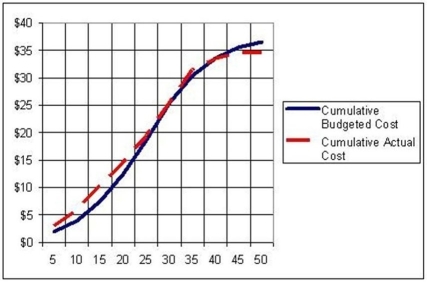


Unlock Deck
Unlock for access to all 104 flashcards in this deck.
Unlock Deck
k this deck
36
The earned value divided by the actual, cumulative cost of the work to date is the:
A) Cost performance index.
B) Budgeted cost at completion index.
C) Budget efficiency index.
D) Schedule performance index.
A) Cost performance index.
B) Budgeted cost at completion index.
C) Budget efficiency index.
D) Schedule performance index.

Unlock Deck
Unlock for access to all 104 flashcards in this deck.
Unlock Deck
k this deck
37
Earned value management jointly considers the impact of:
A) Time, cost, and planned cost.
B) Project performance, planned performance, and cost.
C) Performance, cost, and time.
D) Planned cost, planned performance, and time.
A) Time, cost, and planned cost.
B) Project performance, planned performance, and cost.
C) Performance, cost, and time.
D) Planned cost, planned performance, and time.

Unlock Deck
Unlock for access to all 104 flashcards in this deck.
Unlock Deck
k this deck
38
It is possible to measure both positive and negative deviations from the schedule baseline with the tracking Gantt chart.

Unlock Deck
Unlock for access to all 104 flashcards in this deck.
Unlock Deck
k this deck
39
Earned value is:
A) The total budget for the project.
B) A cost estimate of the budgeted resources across the project's life cycle.
C) The real budgeted value of the work that has actually been performed to date.
D) The cumulative total costs incurred in accomplishing the various project work packages.
A) The total budget for the project.
B) A cost estimate of the budgeted resources across the project's life cycle.
C) The real budgeted value of the work that has actually been performed to date.
D) The cumulative total costs incurred in accomplishing the various project work packages.

Unlock Deck
Unlock for access to all 104 flashcards in this deck.
Unlock Deck
k this deck
40
Take the factors considered by earned value analysis and subtract those considered by project S-curves. The factor(s) you have remaining are:
A) Performance and cost.
B) Cost and schedule.
C) Time.
D) Performance.
A) Performance and cost.
B) Cost and schedule.
C) Time.
D) Performance.

Unlock Deck
Unlock for access to all 104 flashcards in this deck.
Unlock Deck
k this deck
41
Use the earned value table to determine the schedule performance index given the indicated state of the project. 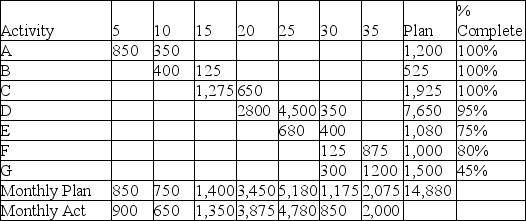
A) 0.89
B) 0.92
C) 1.09
D) 1.13

A) 0.89
B) 0.92
C) 1.09
D) 1.13

Unlock Deck
Unlock for access to all 104 flashcards in this deck.
Unlock Deck
k this deck
42
Use the data to calculate the schedule performance index for the project for the end of week 10. All amounts are in thousands of dollars. 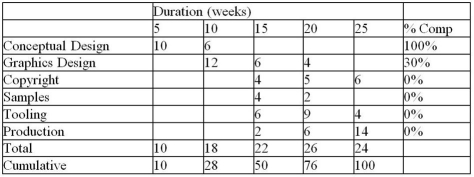
A) 1.24
B) 0.93
C) 0.81
D) 0.76

A) 1.24
B) 0.93
C) 0.81
D) 0.76

Unlock Deck
Unlock for access to all 104 flashcards in this deck.
Unlock Deck
k this deck
43
Use the earned value table to determine the cost performance index given the indicated state of the project. 
A) 0.89
B) 0.92
C) 1.09
D) 1.13

A) 0.89
B) 0.92
C) 1.09
D) 1.13

Unlock Deck
Unlock for access to all 104 flashcards in this deck.
Unlock Deck
k this deck
44
Use the data to calculate the earned value for the project. All amounts are in thousands of dollars. 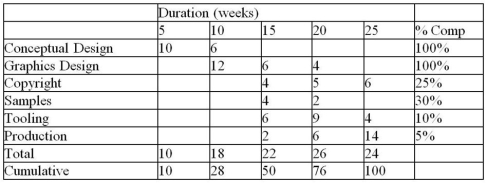
A) $38,500
B) $46,550
C) $56,750
D) $61,125

A) $38,500
B) $46,550
C) $56,750
D) $61,125

Unlock Deck
Unlock for access to all 104 flashcards in this deck.
Unlock Deck
k this deck
45
Use the earned value table to determine the estimated cost to completion given the indicated state of the project. 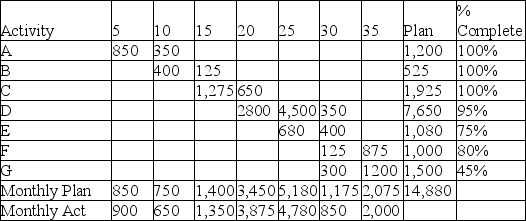
A) $15,966
B) $16,235
C) $18,164
D) $17,441

A) $15,966
B) $16,235
C) $18,164
D) $17,441

Unlock Deck
Unlock for access to all 104 flashcards in this deck.
Unlock Deck
k this deck
46
Use the data to calculate the earned value for the project. All amounts are in thousands of dollars. 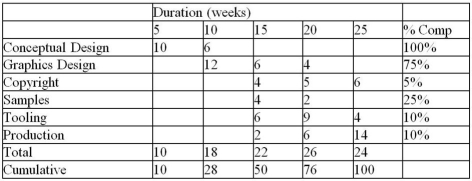
A) $38,500
B) $43,250
C) $54,750
D) $100,000

A) $38,500
B) $43,250
C) $54,750
D) $100,000

Unlock Deck
Unlock for access to all 104 flashcards in this deck.
Unlock Deck
k this deck
47
In earned value management, schedule variance is defined as:
A) The difference between the earned value and the actual cost.
B) The difference between the earned value and the planned value.
C) The difference between the actual cost and the planned value.
D) The difference between the cost and schedule performance indices multiplied by the budgeted cost at completion.
A) The difference between the earned value and the actual cost.
B) The difference between the earned value and the planned value.
C) The difference between the actual cost and the planned value.
D) The difference between the cost and schedule performance indices multiplied by the budgeted cost at completion.

Unlock Deck
Unlock for access to all 104 flashcards in this deck.
Unlock Deck
k this deck
48
At the end of week 10, this project has cost $9,000 and has an earned value as indicated in the table. Use the data to calculate the cost performance index for the project. All amounts are in thousands of dollars. 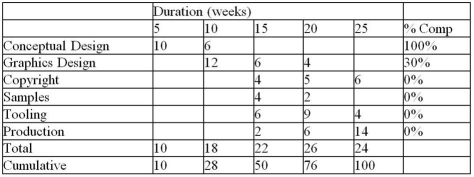
A) 2.5
B) 2.1
C) 1.8
D) 1.5

A) 2.5
B) 2.1
C) 1.8
D) 1.5

Unlock Deck
Unlock for access to all 104 flashcards in this deck.
Unlock Deck
k this deck
49
The first step in earned value management is to:
A) Create the activity and resource usage schedules.
B) Develop a time-phased budget that shows expenditures across the project's life.
C) Total the actual costs of doing each task to arrive at the actual cost of work performed.
D) Clearly define each activity that will be performed including its resource needs and budget.
A) Create the activity and resource usage schedules.
B) Develop a time-phased budget that shows expenditures across the project's life.
C) Total the actual costs of doing each task to arrive at the actual cost of work performed.
D) Clearly define each activity that will be performed including its resource needs and budget.

Unlock Deck
Unlock for access to all 104 flashcards in this deck.
Unlock Deck
k this deck
50
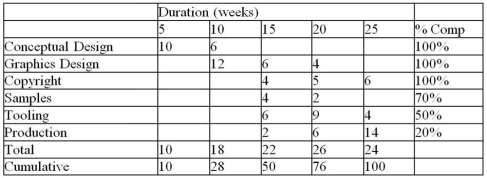
At the end of week 20, this project has cost $79,000 and has an earned value as indicated in the table. Use the data to calculate the cost performance index for the project. All amounts are in thousands of dollars.
A) 1.11
B) 0.82
C) 0.94
D) 0.90

Unlock Deck
Unlock for access to all 104 flashcards in this deck.
Unlock Deck
k this deck
51
Use the earned value table to determine the estimated time to completion given the indicated state of the project. 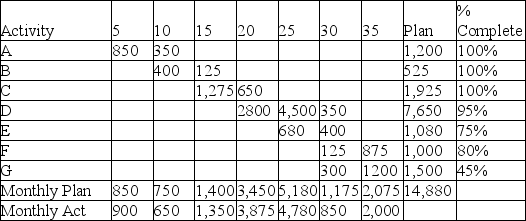
A) 35 days
B) 37 days
C) 39 weeks
D) 41 weeks

A) 35 days
B) 37 days
C) 39 weeks
D) 41 weeks

Unlock Deck
Unlock for access to all 104 flashcards in this deck.
Unlock Deck
k this deck
52

Use the data to calculate the earned value for the project. All amounts are in thousands of dollars.
A) $65,500
B) $69,550
C) $71,100
D) $76,125

Unlock Deck
Unlock for access to all 104 flashcards in this deck.
Unlock Deck
k this deck
53
A project manager can calculate the projected schedule of the project to completion by using the:
A) Cost performance index.
B) Schedule performance index.
C) Budgeted cost at completion index.
D) Budget efficiency index.
A) Cost performance index.
B) Schedule performance index.
C) Budgeted cost at completion index.
D) Budget efficiency index.

Unlock Deck
Unlock for access to all 104 flashcards in this deck.
Unlock Deck
k this deck
54
The project baseline is established by combining data from the:
A) Work breakdown structure and the project budget.
B) Time-phased project budget and the PERT chart.
C) S-curve and the project budget.
D) Time-phased project budget and the work breakdown structure.
A) Work breakdown structure and the project budget.
B) Time-phased project budget and the PERT chart.
C) S-curve and the project budget.
D) Time-phased project budget and the work breakdown structure.

Unlock Deck
Unlock for access to all 104 flashcards in this deck.
Unlock Deck
k this deck
55
Use the data to calculate the schedule performance index for the project for the end of week 20. All amounts are in thousands of dollars. 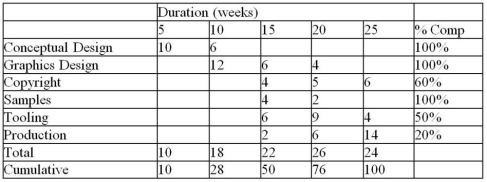
A) 1.14
B) 0.88
C) 0.94
D) 0.81

A) 1.14
B) 0.88
C) 0.94
D) 0.81

Unlock Deck
Unlock for access to all 104 flashcards in this deck.
Unlock Deck
k this deck
56
Use the earned value table (all amounts indicated are dollars) to determine the earned value to the nearest hundred dollars given the indicated state of the project. 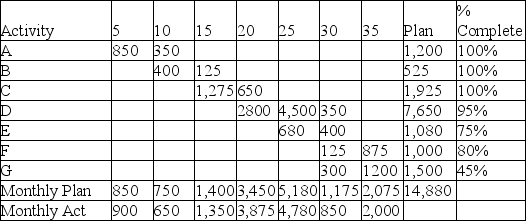
A) $16,900
B) $14,900
C) $14,400
D) $13,200

A) $16,900
B) $14,900
C) $14,400
D) $13,200

Unlock Deck
Unlock for access to all 104 flashcards in this deck.
Unlock Deck
k this deck
57
Use the earned value table for Project Makeready to determine the earned value at week 49. 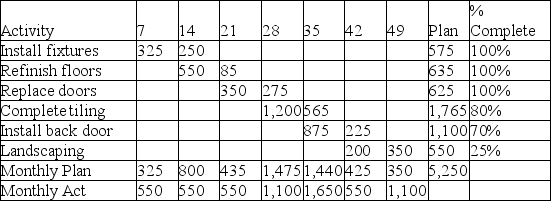
A) $4,950
B) $6,050
C) $4,155
D) $5,250

A) $4,950
B) $6,050
C) $4,155
D) $5,250

Unlock Deck
Unlock for access to all 104 flashcards in this deck.
Unlock Deck
k this deck
58
The budget variance is calculated as:
A) Earned value minus planned value.
B) Planned value minus actual cost.
C) Earned value minus actual cost.
D) Cost minus planned value.
A) Earned value minus planned value.
B) Planned value minus actual cost.
C) Earned value minus actual cost.
D) Cost minus planned value.

Unlock Deck
Unlock for access to all 104 flashcards in this deck.
Unlock Deck
k this deck
59
A project manager can calculate the projected budget to completion by using the:
A) Budgeted cost at completion index.
B) Budget efficiency index.
C) Cost performance index.
D) Schedule performance index.
A) Budgeted cost at completion index.
B) Budget efficiency index.
C) Cost performance index.
D) Schedule performance index.

Unlock Deck
Unlock for access to all 104 flashcards in this deck.
Unlock Deck
k this deck
60
In earned value management analysis, the cumulative amount of the budget becomes the:
A) Planned value.
B) Scheduled value.
C) Cost basis.
D) Cost driver.
A) Planned value.
B) Scheduled value.
C) Cost basis.
D) Cost driver.

Unlock Deck
Unlock for access to all 104 flashcards in this deck.
Unlock Deck
k this deck
61
A project manager needs the work breakdown structure and a time-phased project budget to establish the project baseline.

Unlock Deck
Unlock for access to all 104 flashcards in this deck.
Unlock Deck
k this deck
62
Earned value directly links all three primary project success metrics (cost, schedule, and customer satisfaction).

Unlock Deck
Unlock for access to all 104 flashcards in this deck.
Unlock Deck
k this deck
63
What is earned value management and how can it be used to monitor project status?

Unlock Deck
Unlock for access to all 104 flashcards in this deck.
Unlock Deck
k this deck
64
Five weeks in the semester you have completed 0% of your project management class under the 0/100 rule.

Unlock Deck
Unlock for access to all 104 flashcards in this deck.
Unlock Deck
k this deck
65
Inspired by his trip to Greece, the gentleman farmer decided he needed a Mykonos-style windmill pumping a pond for his sheep and orchard. His earned value table for the project appears below. Develop a plot that shows the project baseline and earned value through June and comment on the project.
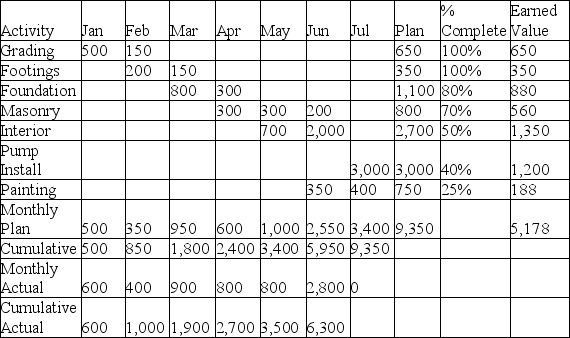


Unlock Deck
Unlock for access to all 104 flashcards in this deck.
Unlock Deck
k this deck
66
Geoff coolly surveyed his earned value table at the conclusion of month 24. It was hard to believe that two short years ago, with his membership at Match.com about to expire, he had managed to craft an ad that was both urbane and manly enough as to catch the eye of the divine Miss Smylie. (The male model photo he substituted for his own certainly didn't hurt either.) Now he was almost done managing this critical project. Some might think him crass for taking such an approach, but he practiced what he preached at the small commuter school where he taught. Calculate all of the schedule and cost variances (costs in the table are in dollars) for this project and comment on Geoff's skills as a project manager.
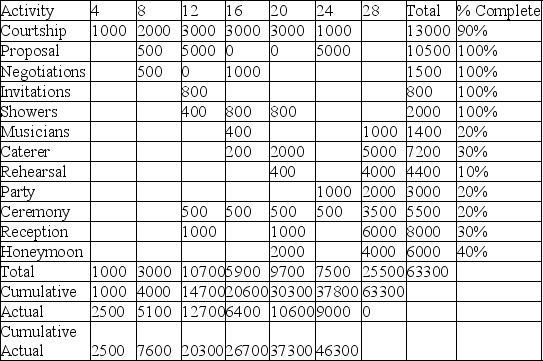


Unlock Deck
Unlock for access to all 104 flashcards in this deck.
Unlock Deck
k this deck
67
Very short work packages would be better managed by:
A) The percentage complete rule.
B) The 0/100 rule.
C) The caveat emptor rule.
D) The prior knowledge rule.
A) The percentage complete rule.
B) The 0/100 rule.
C) The caveat emptor rule.
D) The prior knowledge rule.

Unlock Deck
Unlock for access to all 104 flashcards in this deck.
Unlock Deck
k this deck
68
The one factor that earned value management considers that an S-curve does not include is performance.

Unlock Deck
Unlock for access to all 104 flashcards in this deck.
Unlock Deck
k this deck
69
If an activity's progress is defined as 0% until the activity is complete, the project manager is using:
A) The 50/50 rule.
B) The all or nothing rule.
C) The 0/100 rule.
D) The Do Not Pass Go rule.
A) The 50/50 rule.
B) The all or nothing rule.
C) The 0/100 rule.
D) The Do Not Pass Go rule.

Unlock Deck
Unlock for access to all 104 flashcards in this deck.
Unlock Deck
k this deck
70
What is the cost variance of Project Makeready based on the data in the earned value table shown below? 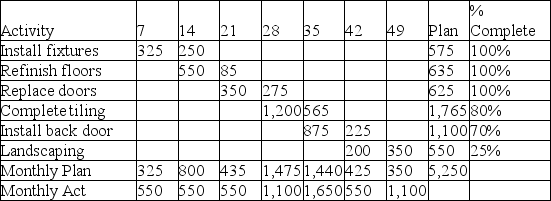
A) -$1,896
B) -$1,096
C) -$800
D) -$406

A) -$1,896
B) -$1,096
C) -$800
D) -$406

Unlock Deck
Unlock for access to all 104 flashcards in this deck.
Unlock Deck
k this deck
71
Your organization is in the midst of a project in uncharted waters; nothing you have attempted before comes close to many of the activities that are necessary to bring this project to completion. Your earned value management should probably be tracked closely with a percentage complete rule in increments of 5 to 10 percent.

Unlock Deck
Unlock for access to all 104 flashcards in this deck.
Unlock Deck
k this deck
72
Use the earned value table for Project Makeready to determine the schedule variance. 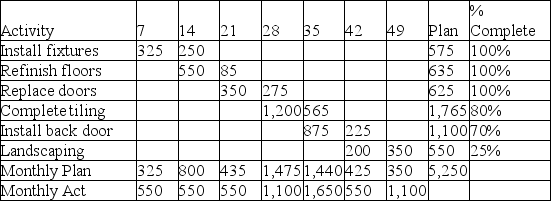
A) -$1,896
B) -$1,096
C) -$800
D) -$206

A) -$1,896
B) -$1,096
C) -$800
D) -$206

Unlock Deck
Unlock for access to all 104 flashcards in this deck.
Unlock Deck
k this deck
73
Once an activity is begun, it is assumed to be half done under the:
A) "Once begun, half done" rule.
B) Minimal effort rule.
C) Midway rule.
D) 50/50 rule.
A) "Once begun, half done" rule.
B) Minimal effort rule.
C) Midway rule.
D) 50/50 rule.

Unlock Deck
Unlock for access to all 104 flashcards in this deck.
Unlock Deck
k this deck
74
Use the earned value table for Project Makeready to calculate the estimated cost to completion. 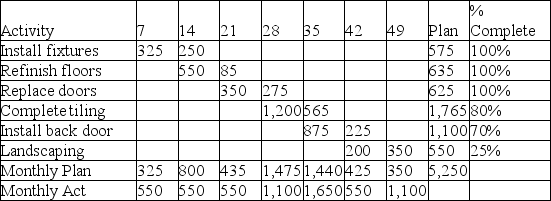
A) $4,285
B) $5,250
C) $6,050
D) $7,645

A) $4,285
B) $5,250
C) $6,050
D) $7,645

Unlock Deck
Unlock for access to all 104 flashcards in this deck.
Unlock Deck
k this deck
75
What are the inputs and the steps in applying earned value management as a project management tool?

Unlock Deck
Unlock for access to all 104 flashcards in this deck.
Unlock Deck
k this deck
76
The earned value of a project is the cumulative total costs incurred in accomplishing the various work packages.

Unlock Deck
Unlock for access to all 104 flashcards in this deck.
Unlock Deck
k this deck
77
Inspired by his trip to Greece, the gentleman farmer decided he needed a Mykonos-style windmill pumping a pond for his sheep and orchard. His earned value table for the project appears below. At the end of June, what was the estimated time to completion and the estimated cumulative cost to completion?
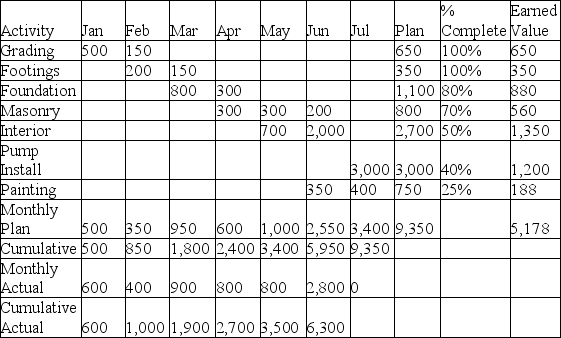


Unlock Deck
Unlock for access to all 104 flashcards in this deck.
Unlock Deck
k this deck
78
Each activity contained a series of milestones that represented a previously agreed-upon amount of work. Once the low graffiti was erased, 35% of the activity had been completed and once the mid-level graffiti was erased, 70% of the activity had been completed. This project manager was clearly in the:
A) Percentage complete camp.
B) Micromanagement camp.
C) 35/70 camp.
D) 3K specifications camp.
A) Percentage complete camp.
B) Micromanagement camp.
C) 35/70 camp.
D) 3K specifications camp.

Unlock Deck
Unlock for access to all 104 flashcards in this deck.
Unlock Deck
k this deck
79
Use the earned value table for Project Makeready to calculate their schedule performance index. 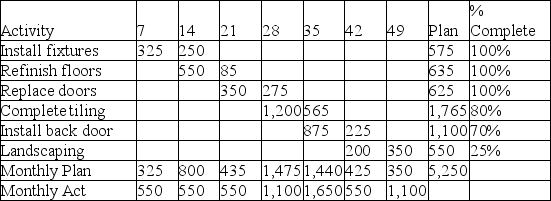
A) 1.46
B) 0.68
C) 0.79
D) 1.26

A) 1.46
B) 0.68
C) 0.79
D) 1.26

Unlock Deck
Unlock for access to all 104 flashcards in this deck.
Unlock Deck
k this deck
80
You are the new consultant to the project manager for a large chicken project. During your first meeting with the project manager he brings you up to speed on the project status by showing you these S-curves. You glance at the graph, compose your thoughts, and make what comments on this project? 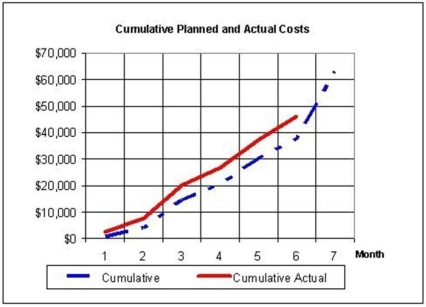


Unlock Deck
Unlock for access to all 104 flashcards in this deck.
Unlock Deck
k this deck



